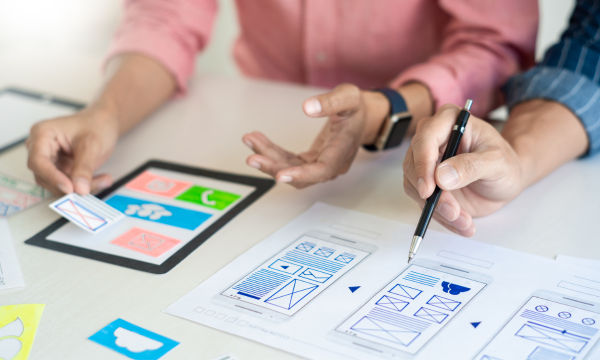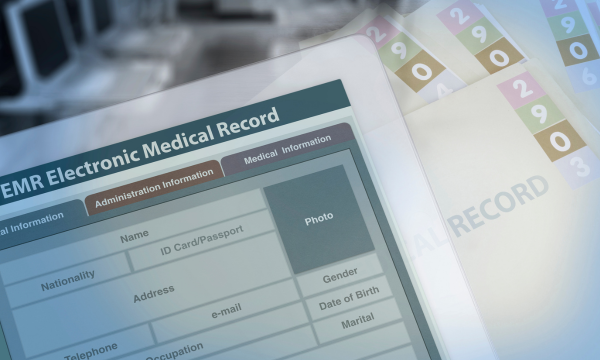The Future of Healthcare: Top App Features for 2023 and Beyond
 25 August 2023
25 August 2023Introduction
In the ever-evolving landscape of technology, the healthcare sector stands out as one of the most transformed industries. The rise of mHealth apps has not only revolutionized patient care but has also bridged the gap between medical professionals and patients, ensuring a seamless healthcare experience. As we navigate the digital age, these applications have become more than just a trend; they are now a necessity.
The global patient-centric healthcare app market is projected to grow from $8 billion in 2023 to a staggering $367 billion by 2028, indicating a CAGR of 35.20% over five years. The significance of mHealth apps extends beyond mere convenience. They represent a paradigm shift in how we approach healthcare, making it more accessible, efficient, and patient-centric. With the rapid advancements in healthcare technology trends, it’s imperative for businesses and medical professionals to stay updated on the latest features and functionalities that define the future of healthcare apps.
Understanding the Purpose of Healthcare Apps
In the vast realm of mobile applications, healthcare apps hold a unique position. They’re not just tools; they’re lifelines, guides, and companions in a person’s health journey. But what drives the success of a healthcare app? It’s the clarity of its purpose.
Identifying the core problem a healthcare app aims to solve is paramount. Whether it’s to provide instant medical consultations, track patient health metrics, or offer therapeutic guidance, the app’s primary function should resonate with the user’s needs. This alignment ensures that the app not only serves its purpose but also enhances the user experience.
From feature integration to HIPAA compliance, we’ve got you covered.
The diverse needs of patients and caregivers further emphasize the importance of purpose-driven healthcare app development. For instance, a patient recovering from surgery might seek an app that offers post-operative care instructions, while a caregiver might look for an app that provides reminders for medication schedules. Catering to these varied requirements requires a deep understanding of the end-users.
In the realm of medical app features, understanding the user’s journey is crucial. From the moment they download the app to the point they achieve their health goals, every interaction should be intuitive, informative, and impactful.
Essential Features for Patients
The digital transformation of healthcare has led to a surge in patient-centric mobile apps. These apps are designed to empower patients, giving them more control over their health and well-being. Let’s explore some of the must-have features for patients in 2023 and beyond.
Easy Registration and Login
The first interaction a user has with an app sets the tone for their entire experience. A seamless registration and login process is crucial. This not only ensures a smooth onboarding experience but also establishes trust. Given the sensitive nature of health data, it’s imperative that the app adheres to HIPAA compliance standards, safeguarding patient information at every step.
An intuitive and user-friendly interface is paramount. As Dr. Peter Fleischut, CIO at NewYork-Presbyterian, points out, patients want basic features in mHealth access that are straightforward and easy to navigate.

Doctor Profile Lookup
Choosing the right healthcare professional is a critical decision. An integrated doctor profile lookup feature allows patients to browse through doctor profiles, read reviews, and make informed choices. Geolocation capabilities can further enhance this feature, connecting patients with nearby medical professionals, ensuring timely care.
Appointment Scheduling
In today’s fast-paced world, the convenience of on-the-go booking cannot be overstated. An efficient appointment scheduling system, complete with real-time confirmations, reduces the hassle for patients and ensures they receive timely medical attention.
Reminders and Notifications
Missed appointments are a thing of the past with effective push notifications. These reminders serve a dual purpose: enhancing user engagement and ensuring patients never miss a medical appointment or medication dose.
Doctor-Patient Communication
The rise of telemedicine has revolutionized healthcare. A secure platform for virtual consultations ensures patients receive medical advice without the need for physical visits. This feature should prioritize encrypted communications, ensuring patient data remains confidential.
The future of healthcare is digital. A study suggests that about 75% of hospital visits are basic and can be managed through phone or video calls. Telemedicine features not only save patients time but also provide them with quality care from the comfort of their homes.
Symptom Checker and In-App Chats
With the advent of AI-driven chatbots, patients can now receive preliminary guidance based on their symptoms. While not a replacement for professional medical advice, these tools offer a starting point for patients seeking insights into their health concerns.
Digital Experience
A smooth user experience is non-negotiable. Data indicates that around 90% of mHealth apps are abandoned after their first use, often due to poor user experience. Designing with the user in mind, especially considering different age groups, can significantly enhance app engagement.
Integration with Medical Devices
The future of healthcare is data-driven. The healthcare wearables market is projected to reach $20 billion by 2023. Integrating with devices like smartwatches and fitness trackers can provide real-time health data, enabling patients to monitor conditions like blood pressure, heart rate, and more.
Access to Medical Records
Instant access to one’s medical history can be a lifesaver in emergencies. Storing this data on HIPAA compliant cloud servers ensures it’s both accessible and secure.
Prescription Tracking
Digital prescriptions offer clarity and efficiency. With integrated pharmacy look-up features, patients can locate the nearest pharmacy, check medication availability, and even set reminders for refills.
Patient Community
There’s immense power in community support. Specialized health apps that offer community features allow patients to share their experiences, seek advice, and find solace in shared journeys.
A study in the Journal of Medical Internet Research found that over 56% of users felt that in-app social features boosted their motivation to maintain a healthy lifestyle. Such features allow patients to connect with others who share similar health challenges, fostering a sense of community and support.
Health Education
Knowledge is power. Mobile apps that offer accurate health information empower patients, allowing them to make informed decisions about their health and well-being.
Key Features for Doctors
While patients are the primary users of healthcare apps, doctors and medical professionals also benefit immensely from these digital tools. Let’s explore the essential features tailored for healthcare providers.
EHR/EMR Integration
Electronic Health Records (EHR) and Electronic Medical Records (EMR) have become the backbone of modern healthcare. Integrating these records into healthcare apps ensures doctors have instant access to patient histories, test results, and other vital data. This not only streamlines patient care but also aids in making accurate diagnoses and treatment plans.

ePrescriptions
Gone are the days of handwritten prescriptions that could be misinterpreted. ePrescriptions offer clarity, reduce errors, and can be sent directly to a patient’s chosen pharmacy. Moreover, with the evolving telemedicine laws, ePrescription features are becoming increasingly significant.
HIPAA Compliance
For any feature or tool that doctors use, HIPAA compliance is non-negotiable. Whether it’s video consultations, chat features, or data storage, every aspect of the app must adhere to stringent HIPAA regulations to safeguard patient information.
Patient Management Tools
Doctors often juggle multiple patients, each with their unique medical histories and needs. Patient management tools allow doctors to organize patient data, schedule follow-ups, and even set reminders for specific interventions. This ensures that each patient receives timely and personalized care.
Secure Messaging
Communication is key in healthcare. Secure messaging features allow doctors to communicate with patients, colleagues, and other healthcare professionals. Whether it’s discussing a case, seeking a second opinion, or providing post-operative care instructions, encrypted messaging ensures confidentiality.
Analytics and Reporting
Data-driven insights can significantly enhance patient care. Analytical tools that offer insights into patient outcomes, treatment efficacy, and even operational aspects like appointment cancellations can help doctors and clinics optimize their services.
Continuous Learning Modules
The medical field is ever-evolving. Features that offer continuous learning modules, latest research findings, and updates on medical advancements can help doctors stay at the forefront of their specialties.
Conclusion
The digital transformation of the healthcare sector is not just a fleeting trend; it’s a profound shift that’s reshaping patient care, medical practices, and the entire health ecosystem. As we’ve explored, healthcare apps are at the forefront of this revolution, offering unparalleled convenience, efficiency, and empowerment to both patients and doctors.
For patients, these apps provide a seamless healthcare experience, from booking appointments to accessing medical records. For doctors, they offer tools that streamline patient management, enhance communication, and ensure compliance with critical regulations like HIPAA.
But beyond the features and functionalities, the true value of these apps lies in their potential to revolutionize patient outcomes. By bridging the gap between patients and healthcare providers, these apps are fostering a collaborative approach to health and well-being. They’re enabling timely interventions, personalized care, and a holistic view of health that goes beyond just treatments and medications.
As we look ahead, the role of technology in healthcare is only set to grow. With emerging technologies like AI, blockchain, and advanced data analytics, the possibilities are boundless. For businesses and developers, the message is clear: investing in healthcare technology is not just a business opportunity; it’s a chance to make a tangible difference in people’s lives.
For those looking to navigate this exciting landscape, remember that the journey begins with understanding the needs of the end-users. Whether you’re developing an app for patients or doctors, always prioritize user experience, security, and compliance. And as always, Attract Group is here to guide you every step of the way.
FAQs
1. What is the projected growth of the global patient-centric healthcare app market?
The global patient-centric healthcare app market is anticipated to grow from $8 billion in 2023 to an impressive $367 billion by 2028.
2. Why are healthcare apps considered more than just a trend in the medical industry?
Healthcare apps have become a necessity due to their ability to revolutionize patient care, bridge the gap between medical professionals and patients, and ensure a seamless healthcare experience.
3. What are some of the must-have features for patients in healthcare apps for 2023 and beyond?
Essential features include easy registration and login, doctor profile lookup, appointment scheduling, reminders and notifications, doctor-patient communication, symptom checker, integration with medical devices, access to medical records, prescription tracking, and patient community.
4. How do healthcare apps benefit doctors and medical professionals?
Healthcare apps provide doctors with features like EHR/EMR integration, ePrescriptions, HIPAA compliance, patient management tools, secure messaging, analytics and reporting, and continuous learning modules.
5. What is the significance of user experience in healthcare apps?
A smooth user experience is crucial as data indicates that around 90% of mHealth apps are abandoned after their first use, often due to poor user experience. Designing with the user in mind can significantly enhance app engagement.
6. What does the term “mHealth” represent?
“mHealth” stands for “mobile health”. Which refers to the practice of using mobile devices, applications, and technologies to deliver healthcare services and information. It encompasses a broad range of solutions, from mobile apps that track fitness and manage patient records to wearable devices that monitor vital signs. mHealth aims to improve patient care, health outcomes, and accessibility while reducing healthcare costs. It leverages the widespread use of smartphones and wearable devices to bring healthcare directly to individuals, regardless of their location.










